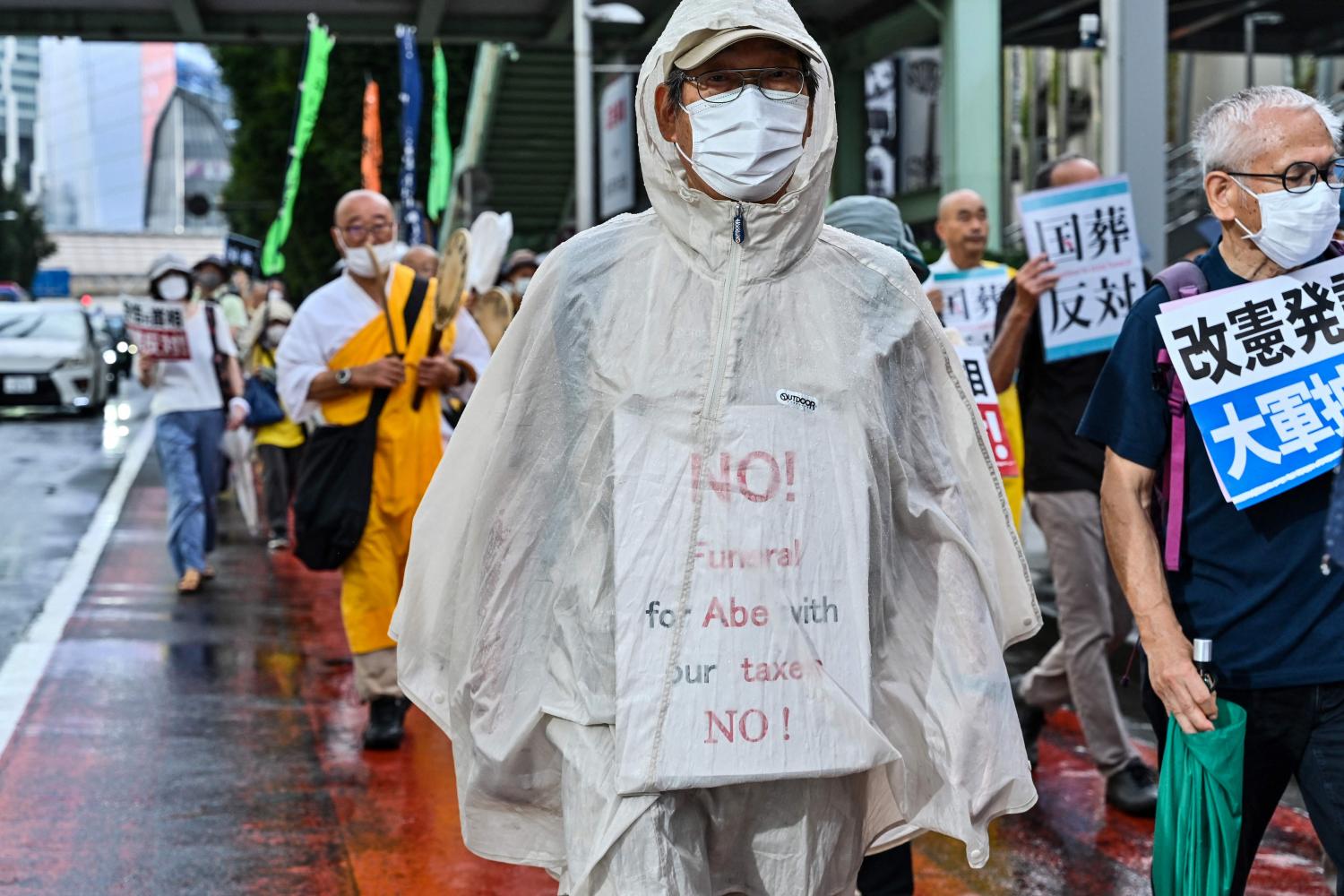
In a country where voters are increasingly opposed to a state funeral for Shinzo Abe, support for the event remains high among younger Japanese who see themselves as having benefited from his economic policies during his record run as premier.
For many voters in their 20s, Abe's name is synonymous with a soaring Nikkei stock average and almost full employment under his Abenomics programme.
For older people, revelations about his links with a religious sect whose founder was convicted in the United States of tax fraud rekindled memories of suspected graft and favouritism scandals that clouded his government.
"I want to take pride in the fact that Abenomics became known around the world," said Koharu Yano, a 20-year-old student at a university in Tokyo. "Even if there were some flaws, it's important to emphasise the positive aspects."
Japan's longest-serving premier was shot dead in July by a gunman who authorities said targeted Abe for his ties to the Unification Church, which he blamed for bankrupting his family. The incident exposed embarrassing associations between the ruling Liberal Democratic Party (LDP) and the religious group, which has a long list of court rulings against it over its fundraising methods.
That caused sentiment to shift against the taxpayer-funded event, the first of its kind for a former premier since 1967. It even led a man setting himself on fire near the prime minister's office on Wednesday, with police saying he left a note saying he opposed the state funeral, Kyodo News reported. The man was in his 70s and conscious when taken to a hospital, it added.
A poll conducted by the Asahi newspaper between Sept 10 and yesterday found 58% of those aged 18–29 approved of the memorial service, with the percentage sliding to 26% among those 70 or above. Surveys by public broadcaster NHK last month and this month found similar trends by age group. The most common reason for backing the event was respect for his achievements, the paper said.
Current Prime Minister Fumio Kishida has seen his support fall to its lowest level in several polls since he took office nearly a year ago, with many respondents saying they don't think he is doing enough to cut ties between the Unification Church and the long-ruling LDP.
"I'm against the state funeral," said Hiroshi Kanda, 76, a retired trading company employee living in Kanagawa prefecture, near Tokyo. "I've supported the LDP for a long time, but Abe's scandals put me off."
The state funeral for Queen Elizabeth II -- the United Kingdom's first since PM Winston Churchill's memorial in 1965 -- has further fuelled debate in Japan over whether Abe deserves similar honours.
In Britain, there's a generational divide on support for the monarchy, with older residents viewing the Crown with more favour than younger people, surveys showed.
Mr Kishida has prioritised efforts to ease the economic disparities he said were a side-effect of Abenomics, in an implicit criticism of his former boss. His policies initially brought him support from middle-aged and older voters, in contrast with Abe, who was more popular with the young.
Koji Nakakita, a politics professor at Hitotsubashi University in Tokyo, said much of the political gulf between generations can be put down to the times in which they grew up.
"People are deeply influenced by the political thinking and phenomena of their youth," Dr Nakakita said, meaning that those who grew up under neoliberal administrations are more likely to support Abe. "The senior generation came up under moderate policies," and tend to like Mr Kishida's centrist position, he said.
Tokyo graduate student Misaki Onodera's childhood was overshadowed by the collapse of her father's real estate business in the early 2000s, which left both her parents working two jobs to pay off debts. She grew up hearing her father talk about Abenomics and how the economy seemed to be improving. Her parents eventually found their feet again.
"I have been able to go to university and on to graduate school," the 24-year-old said. "I'm not saying that's all down to Abe, but politicians who find fault with the way a person's funeral is held are cruel."
While opinions on Abe's economic legacy are divided, the Nikkei stock average more than doubled between 2012, when he took office, and 2020, when he resigned citing ill health. Unemployment fell from more than 4% in 2012 to less than 3% in 2017 and stayed there for years.
The funeral may have cost Mr Kishida the confidence of some older voters whose support buoyed him earlier this year. So far, he has little prospect of relying on the young -- far less numerous and less likely to vote -- to make up the difference.
"I had high expectations for Kishida, because I thought he would be good at listening, unlike Abe," said Yoshinori Marukawa, a 70-year-old retired employee of a car manufacturer, living in Hiroshima prefecture. "That makes me all the more disappointed over the state funeral problem. It shows the LDP's arrogant attitude hasn't changed since Abe's time." Bloomberg
Yuki Hagiwara is a Tokyo-based finance reporter at Bloomberg. Isabel Reynolds is a politics reporter for Bloomberg in Tokyo.







